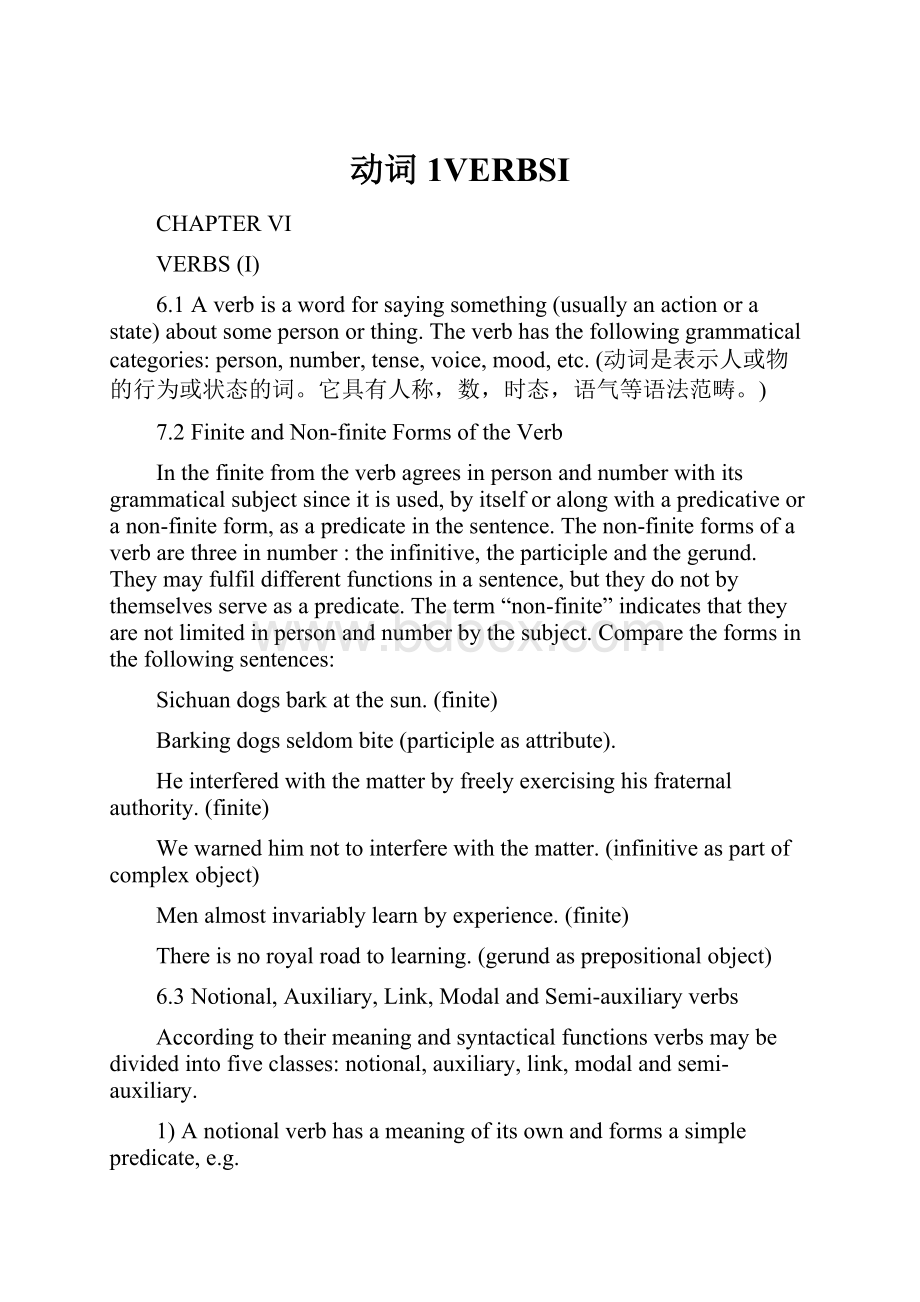动词1VERBSI文档格式.docx
《动词1VERBSI文档格式.docx》由会员分享,可在线阅读,更多相关《动词1VERBSI文档格式.docx(10页珍藏版)》请在冰豆网上搜索。

2)Anauxiliaryverbhelpstoformaverbphraseusedtoexpressasimplepredicate.
3)Alinkverbhelpstoformacompound[nominal]predicate.Themostcommonly-used
linkverbsare“be”,“become”,“remain”,“get”,“turn”,“look”,etc.
4)Amodalverbhelpstoformacompound[verbal]predicate
5)Asemi-auxiliaryverb,likeamodalverb,alsohelpstoformacompound[verbal]
predicate.
Thefollowingarecommonly-usedsemi-auxiliaryverbs:
beabouttobeapttobeboundtobecertainto
begoingtobeliabletobe(un)likelytobesureto
betohadbetter/besthave[got]toappearto
cometofailtogettohappento
seemtoturnoutto,etc.
allsemi-auxiliaryverbs,exceptthosewith“be”or“have”asafirstelement,donottake
inversionornegationwith“not”withoutanauxiliaryormodalverb,e.g.
Ididn’tgettoseeheryesterday.
Igotnottoseeheryesterday.(wrong)
Howcouldyougettoseeheryesterday?
Howgotyoutoseeheryesterday?
(wrong)
But:
Istheteacherlikelytocome?
Youhadbetternottogo.
Semi-auxiliaryverbs,similartomodalverbs,cannotbemadepassivethemselves.Theyallowthepassiveonlyintheinfinitiveafterthem,e.g.
Shegottobeseen.
Shewasgottobeseen.(wrong)[byhim]
Theplayhappenednottobeseen.
Theplaywasn’thappenedtobeseen(wrong)
6.4TransitiveandIntransitiveVerbs
Notionalverbscanbefurtherdividedintotwoclasses:
transitiveandintransitive.
1)Transitiveverbs
Therearethreetypesoftransitiveverbscorrespondingcloselytothedifferenttypesofobject
andcomplement:
(1)Monotransitive(thosetakingadirectobject),e.g.
Don’tsidestepthecrucialquestion.
Ibelievethatheiscorrect.
(2)Ditransitive(thosepermittinganindirectobjectinadditiontoadirectone),e.g.
Canyoushowmethebookyoumean?
Shedidn’ttellmewhatshewaslookingfor.
(2)Complex-transitive(thosetakingacomplexobjecti.e.anobject+complement),e.g.
Healwaysthinkshimselfsomething.
Returnthemagazineswheretheyhavebeen.
2)Intransitiveverbs(thosetakingnoobject),e.g.
Shedancesverywell.
ThebirdswerestillsingingwhenIawoke.
3)Someverbswhichareessentiallytransitivemaysometimesbeusedintransitively.This
takesplace:
(1)Owingtotheresultoftheomissionoftheself-pronoun,e.g.
Asheroseanddressed[himself],hethoughtoverwhathadhappenedthedaybefore.
John,behave[yourself]!
(2)Astheverbisintransitiveinformbutpassiveinmeaning,e.g.
Thecarcan’tdrive.
Theplayreadsmoreeasilythanitacts.
(3)Whentheobjectisclearfromthecontext,e.g.
Hasn’thereceivedmyletter?
Iwrote[theletter]twoweeksago.
TheyarrivedinChangshalastMondayandIleft[Changsha]yesterday.
(4)Whentheobjectisof“generalmeaning”,e.g.
Hespeaksandwriteswell.
Shepaintsnicely.
4)Incontrast,therearesomeotherverbswhichareessentiallyintransitivemaybeused
transitively:
(1)Withacausativemeaning,e.g.
Hewalkedthehorsetoandfro.(=Hemadethehorsewalktoandfro.)
Sheranhereyesoverthelist.
Theymarchedtheprisonersaway.
Hestoodthebottlenearthewindowsill.
(2)Withtheprepositionaftertheverbleftout,e.g.
Thedethronedkinghasalreadyfled[from]thecountry.
Theytalked[about]literaturealltheevening.
Heknowsaninternwhoiswalking[in]thehospitalsthere.
(3)Withacognateobject(i.e.anobjectalreadyimpliedmoreorlessintheverbitself),e.g.
Helivedagreatlife.
Shediedagloriousdeath.
Helaughedaheartylaugh.
LastnightIsleptapeacefulsleepanddreamedahappydream.
5)Veryoftenwithsomeverbswhichcanbeusedbothtransitivelyandintransitively,itisdifficulttoknowwhichofthetwousesistheoriginalone,e.g.
TransitiveIntransitive
Ididn’tgethisidea.Ididn’tgetatthemeaningofwhathesaid.
SheopenedherhearttotheParty.TheexhibitionopenedlastFriday.
Heisreadingthenewspaper.Hereadswell.
HestoppedthecarandstudiedtheopeningThecarstopped.
withhisfieldglasses.ThevacationbeginsonJuly1st.
Heatoncebeganathirdbook.
6.5FundamentalFormsofVerbs
Thefourfundamentalformsare“thepresentform”,“thepastform”,“thepastparticiple”and
“thepresentparticiple”,e.g.
Present
Past
PastParticiple
PresentParticiple
Regular
work
worked
working
Irregular
speak
spoke
spoken
speaking
Fromthesetheotherformsoftheverbcanbemade.Thepastparticipleisusedwithvariousformsoftheauxiliaryverb“be”toformthepassivevoice,withtheauxiliaryverb“have”toformtheperfecttenses.Thepresentparticiple,whenprecededbyvariousformsoftheauxiliaryverb“be”,formsthecontinuoustenses.Taketheverb“speak”asanexample,thefollowingarethe16tenseforms(active)ofit:
Indefinite
Continuous
Perfect
PerfectContinuous
Speak
speaks
am
arespeaking
is
havespoken
has
Havebeenspeaking
wasspeaking
were
hadspoken
hadbeenspeaking
Future
Shallspeak
will
shallbespeaking
shallhave
willspoken
shallhavebeenspeaking
Past
shouldspeak
would
shouldbe
wouldspeaking
shouldhave
wouldspoken
shouldhavebeen
6.6RegularandIrregularVerbs
1)Regularverbsformthepastformandthepastparticiplebyadding“-ed”andthepresent
participlebyadding“-ing”,tothepresentform,e.g.
PresentPastPastPresent
formformparticipleparticiple
laughlaughedlaughedlaughing
wantwantedwantedwanting
Butsomespellingchangesshouldbenoted:
(1)Withverbsendingin“e”,add“d”onlyfortheirpastandpastparticipleandomit
“e”before“-ing”inthepresentparticiple,e.g.
livelivedlivedliving
arrivearrivedarrivedarriving
(2)Withverbsendingin“ie”,change“ie”to“y”before“-ing”inthepresentparticiple,e.g.
diedieddieddying
lie(说谎)liedliedlying
(3)Withverbsthatendin“y”precededbyaconsonant,changethe“y”to“i”before“-ed”,
e.g.
drydrieddrieddrying
trytriedtriedtrying
(4)Thefinalconsonantletterisdoubledbefore“-ed”and“-ing”iftheconsonantissingle,
precededbyasinglevowelletter,andiftheverbismonosyllabicorstressedonthelastsyllable,e.g.
dipdippeddippeddipping
laglaggedlaggedlagging
controlcontrolledcontrolledcontrolling
(5)Withafewverbsendingin“c”,change“c”to“ck”before“-ed”and“-ing”,e.g.
mimicmimickedmimickedmimicking
traffictraffickedtraffickedtrafficking
(6)Withverbsthatendin“I”andafewotherverbs,doublethefinalconsonantevenwhen
thelastsyllableisnotstressed,e.g.
marvelmarvelledmarvelledmarveling
traveltravelledtravelledtravelling
worshipworshippedworshippedworshipping
2)Allverbsthatdonotformthepastformandthepastparticiplebyaddingtheending“-ed”
tothepresentformarecalledirregularverbs.Irregularverbsmaybedividedintofourgroups:
(1)Boththepastformandthepastparticipleareidenticalwiththepresentform,e.g.
cutcutcutcutting
letletletletting
spreadspreadspreadspreading
(2)Thepastformandthepastparticipleareidenticalbutdifferfromthepresentform,e.g.
sitsatsatsitting
telltoldtoldtelling
buildbuiltbuiltbuilding
teachtaughttaughtteaching
(3)Eitherthepastformorthepastparticipleisidenticalwiththepresentform,e,g.
beatbeatbeatenbeating
comecamecomecoming
runranrunrunning
(4)Thepastformandthepastparticipledifferfromeachotheraswellasfromthepresent
form,(过去式和过去分词都与现在式不同,而且两者又互不相同,)e.g.
seesawseenseeing
beginbeganbegunbeginning
fallfellfallenfalling
6.7PhrasalVerbs
Unlikesingle-wordverbsasin(a),phrasalverbsaremulti-wordverbs,i.e.verb+adverb(orpreposition,etc.)formingasemanticandsyntacticunit,asin(b)inthefollowing:
Shebroughtup(=reared)herchildrentobeconsiderateofothers.
Phrasalverbsaremadeupof:
1)vi+adv.(=vi),e.g.
Iwillnevergivein(=yield).
2)vi+prep.(=vt),e.g.
Icameupon(=discovered)thebooktheotherday.
Newspaperscalledfor(=demanded)theseverestpunishmentofthecriminals.
3)vt+